Why use a thermometer for food and the top 5 food thermometers for 2019!

A thermometer is a vital piece of equipment for anyone in the food industry. If you work in food transport, storage, cooking, preparation or sales you must have a thermometer to ensure food is being handled and stored safely.
This article outlines the “must-know” facts about food temperature management, thermometers, plus our scientists choice of the top 5 food thermometers available today.
Safe temperature zones for food – the facts
|
The safe temperature zone for food storage is ≤5°C and ≥60°C |
Temperature matters because bacterial growth is an inherent risk in food production and handling. When food reaches temperatures outside of safe temperature limits many types of bacteria which cause food poisoning can multiply to dangerous levels. Here are some examples of bacteria that can cause food poisoning and their ideal temperature range for growth and reproduction.
| Species | Ideal temperature range |
| Salmonella | 5°c to 45°c |
| Staphylococcus aureus | 7°c to 48°c |
| Clostridium perfringens | 15°c to 55°C |
| bacillus cereus | 4°c to 50°c |
| Campylobacter jejuni | 30°c to 45°c |
Food Standards Australia New Zealand – key guidelines affecting thermometers for food
Food Standards Australia New Zealand (FSANZ) is the governmental body responsible for developing food standards for Australia and New Zealand. The FSANZ highlights two areas that are relevant to measuring food temperature. Firstly, what food types are ideal mediums for dangerous bacteria, and secondly, how precise does a thermometer for food need to be?
Potentially Hazardous Foods: Food Standards Australia (FSA) considers hazardous foods any food that contains:
- raw and cooked meat
- seafood
- dairy products
- eggs
- processed fruits and vegetables
- cooked rice and pasta.
Thermometer Accuracy: FSANZ recommends that a food business must, at premises where potentially hazardous foods are handled, have a temperature measuring device that can accurately determine the temperature of food to an accuracy of at least ±1°C.
Types of thermometers for food and their industry applications
The three main types of thermometers used in food industry applications are:
- Infrared thermometers: These instruments are useful for quick checks on packaged food. Be mindful, they only calculate the surface temperature if a product.
- Digital probe thermometers: Considered the “Rolls Royce” thermometer for measuring food temperature because they measure the core temperature of a product.
- Combined digital probe and infrared thermometer: These multi-purpose devices quantify both the internal and surface temperature of food products.
The Top 5 thermometers for food 2019
Instrument Choice scientists have compiled five of our most popular thermometers for food as voted by customers and our testing panel. All the five examples listed below are HACCP compliant pieces of equipment.
1. Infrared Thermometer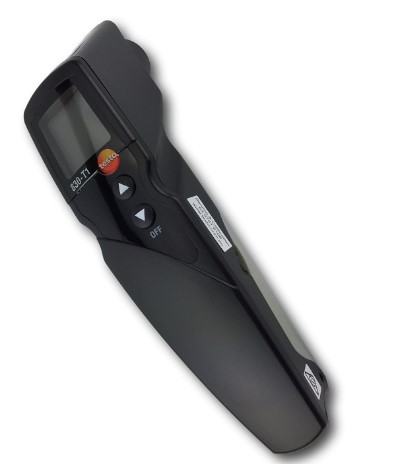
IR Thermometer
Product Code: 0560-8311
This best-selling instrument is ideal for measuring the surface temperature of a product, and for quick temperature checks of packaged food products. Infrared means it is touchless, so you can get rapid measurements without the fear of cross-contamination.
Temperature and Accuracy Specifications
Temperature Range: -20 ºC to 50 ºC
Safe Food Range Accuracy: ±1.5 ºC
2. Digital Probe Thermometer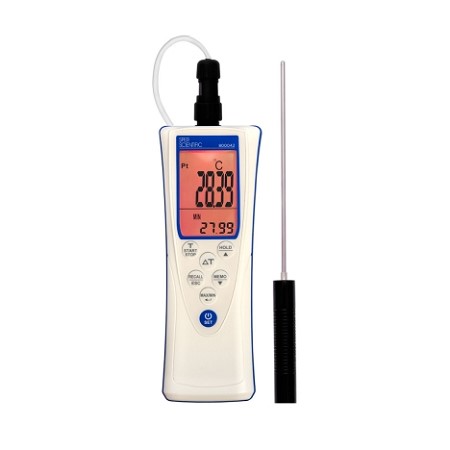
HACCP Thermometer
Product Code: IC-800042
Very accurate, simple and fast to use, the IC-800042 features an LCD backlight that flashes red when food measured is at an unsafe temperature.
Temperature and Accuracy Specifications
Temperature Range: -100°c to 300°c
Safe Food Range Accuracy: ±0.5°c
3. Digital Probe Thermometer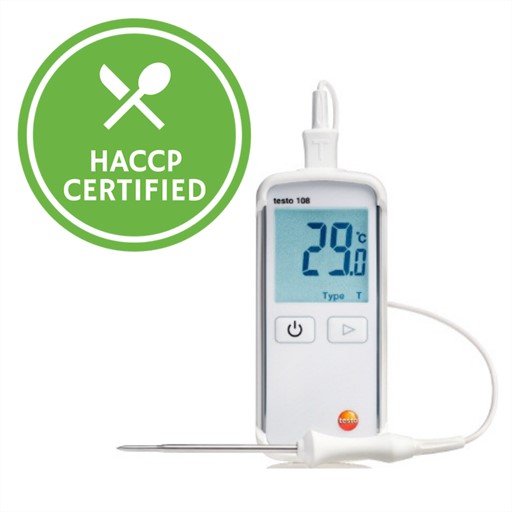
Food Thermometer with Probe
Product Code: IC-0563-1080
Another incredibly fast and reliable device. The IC-0563-1080 excels at the task of measuring temperature during food production, processing and storage.
Temperature and Accuracy Specifications
Temperature Range: -50 to +300 C
Safe Food Range Accuracy: ±0.5 (-30 to +70 C)
4. Digital Probe and Infrared Thermometer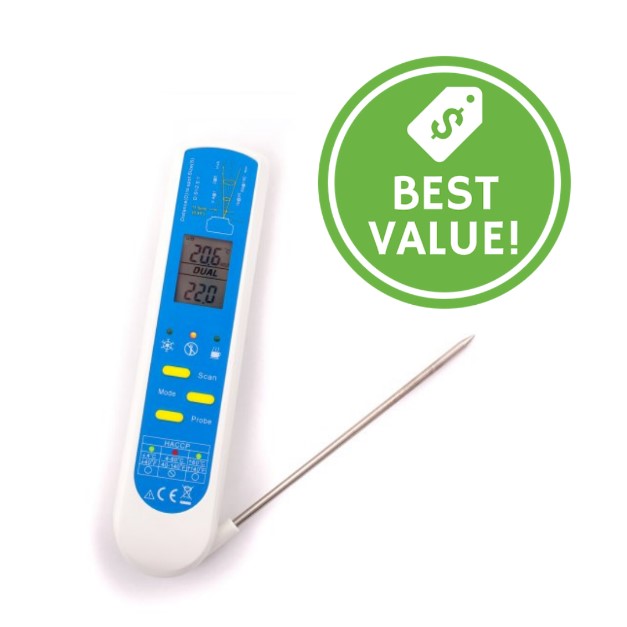
HACCP Food Infrared Thermometer
Product Code: TCT303F
This all-rounder makes the Top Five as a thermometer for food that’s suitable for both surface temperature and internal temperature checks.
Temperature and Accuracy Specifications
Temperature Range Infrared: -55 to 250
Safe Food Range Accuracy Infrared: ± 1(0 to 65)
Temperature Range Probe: -55 to 330
Safe Food Range Accuracy Probe: ±0.5(-5 to 65)
5. Digital Probe and Infrared Thermometer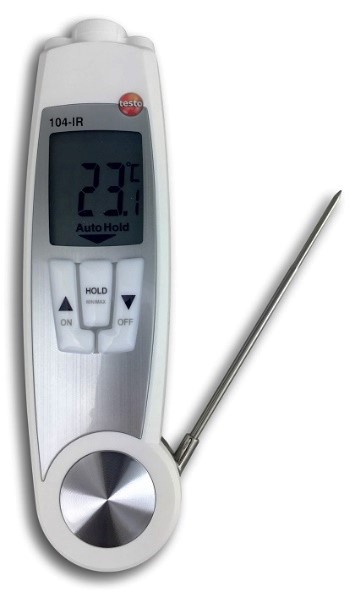
Waterproof Infrared & Probe Thermometer
Product Code: IC-0560-1040
This thermometer not only combines infrared sensors for measuring surface temperature and a fold-out probe for core temperature measurements, it’s very accurate and waterproof. You can use it in all areas of the food production industry.
Temperature and Accuracy Specifications
Temperature Range Infrared: 30 +250 °C
Safe Food Range Accuracy Infrared: ±1.5 °C or ±1.5 % of the measuring value (0.0 to +250.0 °C
Temperature Range Probe: -50 to 250 °C
Safe Food Range Accuracy Probe:
±0.5 °C (-30.0 to +99.9 °C)
Conclusion
That rounds-out Instrument Choice’s Top 5 thermometers for food for 2019.
Food safety should be at the forefront of any food storage, handling or preparation business. Temperature management is vital to food safety, so it is imperative that you have the correct and accurate thermometer to suit your application.
In addition to the five examples of best thermometers for food you can find many more on the Instrument Choice website. Alternatively, if you have any questions about thermometers used in the food industry, or want to know more about any of our Top 5 products you can contact one of our brilliant and helpful scientists on 1300 737 871 or email [email protected].
Also interesting
Did you know that a standard light meter may not be capable of measuring LED light? If you have previously used a standard light meter to measure LED light, chances are you have collected inaccurate or inconsistent results.
This article will explain how LED light meters differ from standard light meters and why it is essential to have the right meter for the job.

Food safety is extremely important in the home and workplace. Unsafe food can create serious illness, and at worst, is a matter of life or death. What role can fridge thermometers play to reduce the risk of food spoilage and foodborne illness?

